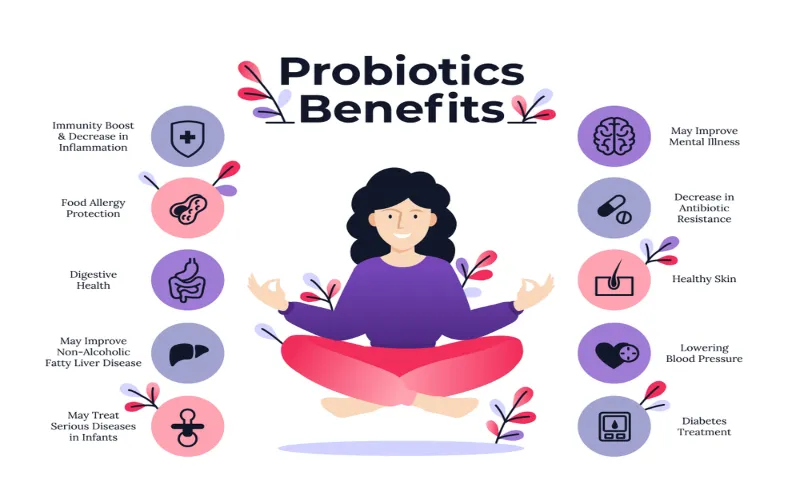Probiotics, derived from the Greek term “for life,” refer to beneficial bacteria and yeasts that provide numerous health advantages when consumed. These microorganisms reside in various locations of our body, especially in the gut. They are commonly found in different foods, especially fermented ones, and are also available as supplements.
Probiotics play a crucial role in balancing our body’s beneficial and harmful bacteria. They’re not just about aiding digestion; their benefits span a broad spectrum of health issues. But the primary question is, “Probiotics are good for what?” Let’s dive deeper.
Benefits of Probiotics
Probiotics have become a significant point of research over the past few decades. The connection between these helpful bacteria and health is compelling, making probiotics an essential part of our diet and supplementation.
Digestive Health
- Irritable Bowel Syndrome (IBS): Many people with IBS have experienced a reduction in symptoms when consuming probiotics. The strains like Lactobacillus and Bifidobacterium have shown promising results in managing constipation, diarrhea, and bloating associated with IBS.
- Inflammatory Bowel Disease: Probiotic supplements might reduce inflammation and stabilize the intestinal tract’s balance of good and harmful bacteria.
- Diarrhea Prevention: Antibiotics, while treating infections, can disrupt the gut’s microbiome. Probiotics, especially Saccharomyces boulardii and some strains of Lactobacillus, can prevent or reduce diarrhea caused by antibiotics.
The digestive system is the primary site where probiotics play an influential role. The gut microbiome, consisting of many bacteria, yeasts, and microorganisms, directly affects our digestive health. Probiotics ensure this system’s balance, preventing various symptoms and conditions.
Immune System Boost
- Infection Prevention: By balancing the gut’s bacteria, probiotics can enhance the body’s natural defenses, potentially preventing infections.
- Reduction in Respiratory Infections: Some research suggests children and adults consuming probiotics might have a reduced risk of respiratory infections.
Our immune system is intricately linked with our gut health. A balanced microbiome ensures a robust defense mechanism against illnesses.
Skin Health
- Eczema Prevention in Children: Probiotic supplements, when taken by pregnant women or given to infants, might reduce the child’s risk of eczema.
- Anti-Inflammatory Effects: Probiotics may help reduce inflammation, often connected to several skin conditions.
The connection between gut health and skin has been explored by many researchers. Probiotics might be the key to unlocking skin’s potential health.
Sources of Probiotics
While supplements are a straightforward way of ingesting probiotics, many foods are naturally rich in these beneficial bacteria.
- Yogurt: The most famous source, yogurt, is made from fermented milk using specific bacterial cultures.
- Kefir: A fermented dairy product similar to yogurt but with a thinner consistency.
- Sauerkraut: Fermented cabbage is not only a source of probiotics but also rich in fiber, which acts as food for these bacteria.
- Kimchi: A fermented Korean dish made of vegetables and spices.
- Prebiotics: Not to be confused with probiotics, prebiotics are types of fiber that feed the friendly bacteria in the gut.
There’s a variety of foods and supplements rich in probiotics. Including them in our daily diet can be one of the best ways to ensure a balanced gut microbiome.
Safety and Side Effects
Like all supplements and medications, probiotics might have side effects. While most people tolerate them well, some might experience gas, bloating, or changes in bowel movements. Always consult with a healthcare professional before starting any treatment or supplement, especially in infants, elderly adults, or those with compromised immune systems.
Despite the many benefits, one must be aware of potential side effects and take them in moderation.
Conclusion
In conclusion, understanding the answer to “probiotics are good for what?” is essential in today’s health-conscious world. The benefits of incorporating these beneficial bacteria and yeasts are manifold, from digestion to immunity and even skin health. We are taking a proactive step towards holistic health by including probiotic-rich foods and supplements in our diet.
What are the primary health benefits of consuming probiotics?
Probiotics are pivotal in digestive health, boosting the immune system and promoting skin health.
How do probiotics help with digestive health?
Probiotics balance the gut microbiome, aiding in conditions like Irritable Bowel Syndrome (IBS) and inflammatory Bowel Disease and preventing diarrhea associated with antibiotic use.
Can probiotics help manage Irritable Bowel Syndrome (IBS)?
Yes, strains like Lactobacillus and Bifidobacterium have shown promising results in managing symptoms like constipation, diarrhea, and bloating associated with IBS.
How do probiotics aid in reducing the effects of antibiotic-associated diarrhea?
Probiotics, especially strains like Saccharomyces boulardii and some Lactobacillus variants, can prevent or lessen the diarrhea caused by antibiotics by maintaining a balanced gut microbiome.




